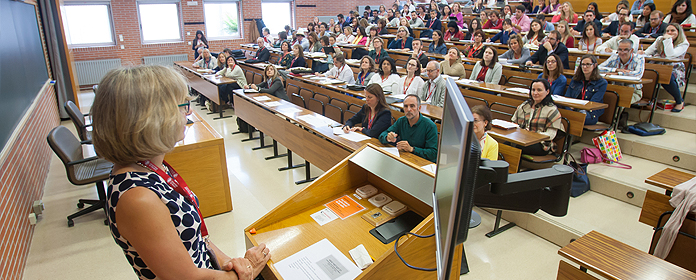"Teachers should be encouraged to make innovative proposals that improve the quality of teaching"
University of Hertfordshire lecturer and researcher at School of Education , Jane Turner, participated in the congress CLIL+ Science

One hundred and a half teachers from national and international educational centers met quotation on June 17 and 18 for the congress International CLIL+Sciencefocused on the learning of Science and Technology in a foreign language organized by the School of Education and Psychology of the University of Navarra.
At meeting, national and international experts reflected on teaching and the learning of science and technology in language foreign languages and discussed the tools and resources that enable teachers to teach in English.
Over two days, attendees discussed how to reconcile the learning objectives of science and technology subjects with the language requirements of a bilingual Education through sessions, workshops, lectures and three plenary conferences.
Professor and researcher at School of Education at the University of Hertfordshire, Jane Turner, and director of the Primary Science Quality Mark awards program, pointed out the importance of supporting teachers in making proposals: "Teachers should be encouraged to make innovative proposals that will improve the quality of teaching. It is necessary to support and accompany them in this process".
For his part, Neil Mercer, Professor Emeritus of Cambridge University, insisted on the protagonism that students acquire in the dynamics of classes with CLIL methodology: "For this subject of teaching to work, a change of paradigm is necessary, where greater participation of student is sought at class". Along these lines, the teacher, researcher, consultant and publisher of Millgate House Education, publishing house that provides resources for teachers, Stuart Naylor, pointed out an example to encourage this participation: "The use of vignettes with dialogues in which situations from everyday life are recreated, promote interaction within classroom; they invite students to share their ideas, without feeling judged".
Throughout these two days, attendees had the opportunity to address how the use of a non-native language affects teachers and students. language non-native language affects teachers and students, as well as how learning science and technology in a foreign language language boosts the language skills of students at different educational levels, both at Education primary, secondary and higher education.




